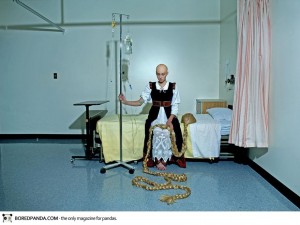Fallen Princesses: Beyond “Happily Ever After”

Source: dinagoldstein.com (via)
Happy Halloween! Or, should I say, welcome to the time of year when we discuss problematic costumes and, obviously, Mean Girls. I used to think that this was as far as the conversation would go. However, I was recently directed to Diana Goldstein’s Fallen Princesses. (To see all of the images at once, try here.) Fallen Princesses plucks our childhood idols from their fantastical castles and inserts them into the very real problems women face today. Disney princesses may not have to deal with loneliness, obesity, war, cancer, or the environmental impact of consumerism – but we do.
I’m not a Disney-hater. I enjoyed the films as much as many other children, and you may have found me singing “A Whole New World” and “Under the Sea” on the beach this weekend. Still, as exhibited by Goldstein’s project, it’s time for some new stories, some more complex stories. We don’t even have to go back to the original Grimm tales – thoughtfully romanticized by Disney – to do so. Let’s start with the fictional.
Take Hazel (who has cancer) and Augustus (who still has a hamartia), the star-crossed lovers of John Green’s bestselling The Fault in Our Stars. Speaking about the upcoming film adaptation (due in theaters June 2014), the author says:
When was the last time you saw a movie in which the leading lady has nasal cannula in every scene of the film? It does not happen. Hollywood usually doesn’t make, like, love stories about disabled teenagers. Source
Cancer doesn’t go away simply because there are few multifaceted, mainstream depictions of characters who, by the way, have cancer. Furthermore, real people have flaws. Real women (like Hazel) are, at times, selfish and moody. That’s okay, because we are also funny and giving and a hundred other traits besides. We don’t need to expect ourselves to be able to sing on pitch with fluttering birds while riding magic carpets and balancing in glass slippers (or something).
If we venture into the Real World, though, I can think of no better princess than Malala Yousafzai. She knows struggle. She knows war. She is wiser than any fairy godmother. Her strength and unwavering passion are far truer marks of nobility than the inability to sleep with a pea tucked beneath an astonishing amount of bedding.
So be a princess – tonight or any day after. Or be a queen. Or don’t. Either way, revel in your complexity. Remember that nobody’s life is perfect; it only seems that way because they don’t permit you to peer behind the curtain, to sneak a glimpse of the chapter following “The End.” “Happily ever after” is never really the end. We have a lot to talk about: beauty myths, poverty, our treatment of the elderly and the disabled. We don’t need Disney to confront these issues. We’re our own heroines, and we’ve got plenty of battles from which to choose.
Miel Jasper
Managing Director
Scr ’16

![[in]Visible Magazine](https://community.scrippscollege.edu/invisible/wp-content/uploads/sites/5/2011/04/Invisible-Masthead-2011-Spring1.png)








Comments are closed.